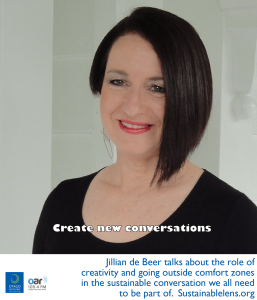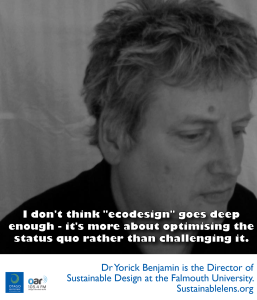Create new conversations
Jillian de Beer is a creative strategist who specialises in strategy for innovation and growth, enterprise development, business and economic transformation, cultural brand identity and market development. Amongst many other achievements, she founded Incredible Edge. In this wide-ranging discussion we talk about the role of creativity in the sustainable conversation.
Talking points
The type of businesses, the type of technology based applications that we need to survive in the next era
if you have a big idea, how are you going to pull off the big idea? the way you do it is getting people around the table…and saying how can we collaborate to pull off this big idea.
It’s in my DNA: making, crafting – that’s bigger than the idea.
Sensorially rich environments
When things get taken away, it’s the artists and creatives who move in and remake and reclaim that space to leave a legacy for the community to follow.
It’s extraordinary when New Zealanders stand up and are counted on their values. And they speak with true conviction about the world and its well-being, and how the people of the plant needing to take notice of change that will affect us all.
(Growing up in NZ’s rural South Island)…The vista is borderless. You grow up thinking beyond the horizon with no construct.
That’s been my life – looking beyond the office door. Looking to what I don’t see. Looking beyond to who I don’t see.
You can have paper in the in tray, and you can move it to the out tray – but what difference have you made everyday?
It’s about not just creating value, but creating change in what you are doing – that’s adding real value.
It’s also about asking who are the beneficiaries? who is this for? what is the purpose? what’s the legacy you are going to leave?
Profound shift from hierarchical to horizontal landscape.
We have a world of order and a world of disorder…and they’re all connected.
Intergenerational equity will best come from a whole of community approach. We need to learn from saying – “an apple doesn’t fall far from the tree”. The older people have all this wisdom and the young people are the eyes of the future. We need to take advantage of this lineage and close this gap.
People need to come together around shared values.
Sometimes you have to drop a bombshell because the future is now. We have to together, now, say what is important to us and the next generations.
Everybody has to make some action to shift the goal posts into a more positive zone. And take responsibility for what they see around them – we all have to do our part.
I don’t think some of the facts of change are really brought out, and we need to be honest about that.
Change has to come from the grassroots community. Governments are risk averse – but innovation, entrepreneurship, initiative needs community.
We need to stand up and comment on policy.
We need to celebrate roles that can make a difference.
In a resource constrained future we need to be making with a different set of resources as a choice.
If we keep thinking of things as resources, we use and use and use until it’s all gone – but if it’s an asset we might think differently.
A creative ecology is the ecosystem of people and all living things that it takes to pull off a movement.
The way of the world now is a shared collaborative experience of people who together can pull off something special.
Sometimes its change by evolution, sometimes it’s revolution.
We have to make our own communities, our own business networks resilient – be proactive
(Activist?) Yes. I think if something is wrong I do something about it. I’m pretty strong on values. I’m pretty strong on openness, transparency and honesty.
I’ve learnt if you see something really wrong, do something about it. It’s very sad when people don’t, and it doesn’t have very good consequences.
(Motivation?) The challenge to make a difference outside of my house.
(Challenges?) Continue to work further south – a journey really.
(Miracle?) Eradicate child poverty.
(Advice for listeners?) Talk to people who you’ve never met before, go outside your comfort zone, cross the line to meet people from other groups, create new conversations, get out of your bubble.


